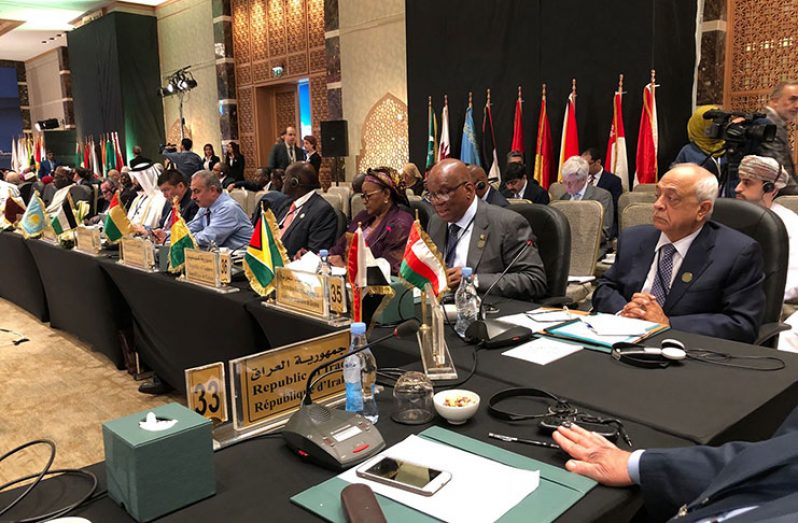GUYANA is in line to receive US$900M from the Islamic Development Bank (IsDB) to facilitate a three-year programme targeting key development areas in the country, including economic infrastructure, rural development, human development and trade and competitiveness, Finance Minister Winston Jordan has said.
In his address to the 43rd Annual Meeting of the Islamic Development Bank Group in Tunisia, Jordan explained that the IsDB fielded a programming mission in December 2017 where a work programme spanning three years–2018-2020–was formalised. He said approximately US $900M has been set aside to provide financing and technical assistance in key development areas such as economic infrastructure, rural development, human development and trade and competitiveness.
“It is quite evident that our joint efforts can go a long way in bringing about socio-economic stability and prosperity in Guyana, which can redound to the benefit of the Latin American and Caribbean Region. Guyana remains hopeful for its future and grateful for the Bank’s support,” Minister Jordan said.
While taking stock of the progress made by the A Partnership for National Unity + Alliance for Change (APNU+AFC) Government since taking office in May, 2015, the Finance Minister spoke of the assistance that is already being provided by the IsDB. “Agriculture continues to be a major contributor to growth and expansion in our economy. In this regard, the Government has leveraged the inter-locking capacity of the Bank, and is currently in an advanced stage of designing a Reverse-Linkage Project with the Malaysia Agricultural Research and Development Institute (MARDI), which will assist in updating Guyana’s expertise and technology in rice production,” the Finance Minister pointed out.
According to him, the project will support the introduction of innovative rice varieties that are more resilient and also will significantly increase rice yields per acre.
Minister Jordan said with the IsDB’s continued support as a financing mechanism and provider of technical expertise, Guyana is optimistic about the growth of its non-traditional agricultural sector that is in line to benefit from new technologies and supporting infrastructure.
“These efforts will not only ensure national food security, but, also, substantially transform the cost structure and competitiveness of our agriculture sector,” he posited.
In the area of education, the Finance Minister noted that the Guyana Government in partnership with the IsDB has developed a project that will embrace the Inquiry Based Science and Mathematics Education (IBSME) approach at both the primary and secondary levels.
“This project will embrace the Inquiry Based Science and Mathematics Education (IBSME) approach. It will also make use of UNESCO’s Global Micro-Science Experiments programme and supporting mathematics kits and will lead to the integration of mathematics through science lessons,” he explained, while adding that it will also raise the level of scientific and mathematical literacy among teachers and students and simultaneously support a learner-centered environment.
In 2017, the minimum standards for elderly residential care facilities were completed and enacted in Guyana, the Minister further reported. He noted that concurrently, the Government approached the Bank for its support and assistance to design a project which will modernise and upgrade the facilities of the Palms Geriatric facility. That project is expected to procure equipment and furniture. It will also result in the provision of enhanced medical care.
Meanwhile, in reporting on other aspects of Guyana’s development, Minister Jordan noted that the Government is forging ahead with a number of key strategic approaches for the economic well-being of the country. These include strengthening national planning; building a robust oil and gas industry; consolidating the macroeconomic fundamentals; fostering economic diversification; strengthening private sector capacity and its involvement in national development; diversification of the agricultural sector; investing in human and social development; development of climate resilient infrastructure; and pursuing equitable growth in a green development agenda.
He also informed the leaders on Guyana’s Green State Development Strategy, explaining that it will ensure sustainable growth with equity that redounds to the economic well-being of every citizen. “It could become, quite possibly, a model for other like- minded economies,” he posited.
The strategy is being fashioned through a collaborative and consultative process.
“It will allow our people an opportunity to shape the scope and scale of our development priorities, given our existing and future resource flows,’ he explained, while adding that “My Government will continue to assess the economic tides and employ timely policy measures to correct imbalances and mitigate negative effects that could stymie growth. In this regard, we aim to strengthen our analytical capability to determine the macroeconomic effects of various policies and interventions employed to grow our economy.”
Additionally, Guyana has recently adopted a Public-Private Partnership (P3) Framework that provides a structured platform for local and external private sectors to meaningfully engage with Government to achieve economic development.
President of the IsDB, Dr. Bandar Hajjar; Governors, Alternate Governors and members of delegation were among those present at the 43rd Annual Meeting of the Board of Governors of the Islamic Development Bank.



.jpg)










